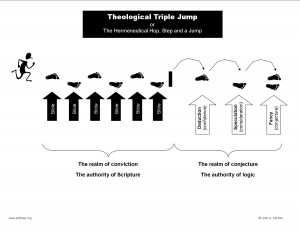How does this theological triple jump show itself when we think through some specific issue? Let’s take the issue of suffering as a test case. This seems reasonable, for we are assured in the Scriptures that suffering is an integral part of the Christian’s experience in this life. But why do we suffer?
The Bible gives us some clear, though general, guidance about the purposes of suffering. For example those purposes include:
- Suffering as a test – in order to prove something. (James 1:2-3)
- Suffering as discipline – in order to correct something. This is a sign of love. (Hebrews 12:6-11)
- Suffering as participation – in order that we might share more intimately and fully with Christ. (Philippians 3:8-10)
- Suffering as a fact – simply existing in a fallen world means that the negative consequences of the fall affect us. (Romans 8:17-23)
- Suffering as refining – in order to purify and mature something. This relates to our sanctification. (1 Peter 4:1-2; 5:10; Malachi 3:2-4)
You might find in the Scriptures other purposes of suffering. My intent here is not to build a complete theology of suffering, but to help us see just how the theological triple jump affects how we think of what the Scriptures say and how it applies to what we experience.
The five possible purposes of suffering are clear. They are helpful. If we had built a comprehensive theology of suffering we could even say that they are sufficient to help us understand what we need to understand regarding our suffering so we can honor God and obey Him in that suffering. Yet this does not answer all of our questions. And it is worth saying that these additional questions are not wrong. They may or may not prove fruitful, but the fact of their presence is not wrong. And the fact of their presence moves us, very naturally, to seek answers to them. But these answers may move us off of the solid ground of clearly revealed truth into the theological triple jump. These questions may include:
- Why this particular form of suffering?
- Why is this particular person suffering?
- Why is this occurring at this particular time in this person’s life?
For instance, someone may look upon another who is suffering an declare, “This is God’s discipline!”
But do we know this? We have divine warrant to conclude this could be the purpose of this particular person’s suffering, but do we have Scriptural authorization to announce that it is the reason in this person’s life at this time? No. Perhaps their suffering is God’s discipline, but we do not know that with revelatory certainty.
So what do we make of this friend’s conclusion? They have taken the first step into the realm of conjecture. They have made a deduction. There can be some level of confidence in the possibility of this, assuming for the moment some other factors in the person’s life. But we do well to remember that confidence is not certainty.
Having concluded the person is suffering as a form of divine discipline, the next question is why has God chosen to discipline this person? Perhaps the “friend” goes on to declare that God is disciplining the person because of some disobedience in their life. This is the second leap into the realm of conjecture. This is speculation. Could this be the case? Yes. Is it in fact the case? Do we have certainty of this? No. The “friend” should have stated their case as a consideration for their friend (Is there any cause for God to bring discipline into your life?) rather than a fact.
The third question might be, “Why is this occurring at this particular time in their life?” Perhaps the person’s “friend” believes he has an answer to this as well – it is because of a failure to spend sufficient time in God’s Word each day. Does this “friend” know this in the sense of revelatory, Scriptural certainty? No. Even if he has evidence that his friend has indeed not been reading God’s Word each day, he does not know that this is God’s reason for allowing this suffering at this time. He has entered the land of fancy and is basing his conclusion on conjecture.
He is now three steps beyond the realm of conviction based upon the authority of Scripture and is full into the realm of conjecture based upon the authority of logic.
It is not difficult to imagine the many ways these three leaps beyond the solid ground of Scriptural truth could compound the suffering man’s pain.
But what should the “friend” have done instead? Should he only have shared, at appropriate times and in appropriate ways, what Scripture teaches about the possible purposes of suffering? This he could do with conviction and as a way of truly helping his suffering friend. But what of these additional questions? He should not ignore them, but rather put them in appropriate context. He should treat any answers to those questions for what they are: deductions, speculations, and fancies based upon human (even if Spirit-controlled) logic that might be a legitimate extension of the trajectory of Scripture’s clear teaching. He should state them as something that reflects not certainty, but varying levels of confidence, consideration and conjecture. He can sensitively help his friend explore these possibilities, but should stop short of making declarations supposedly backed by divine authority.
